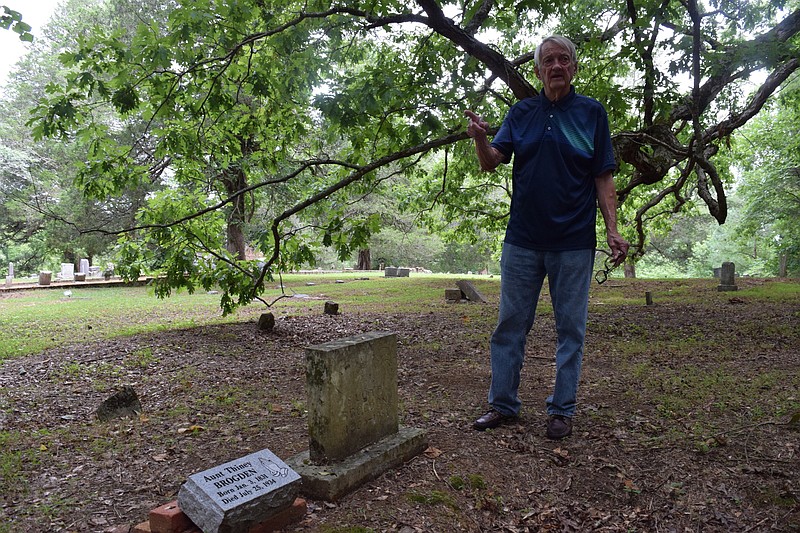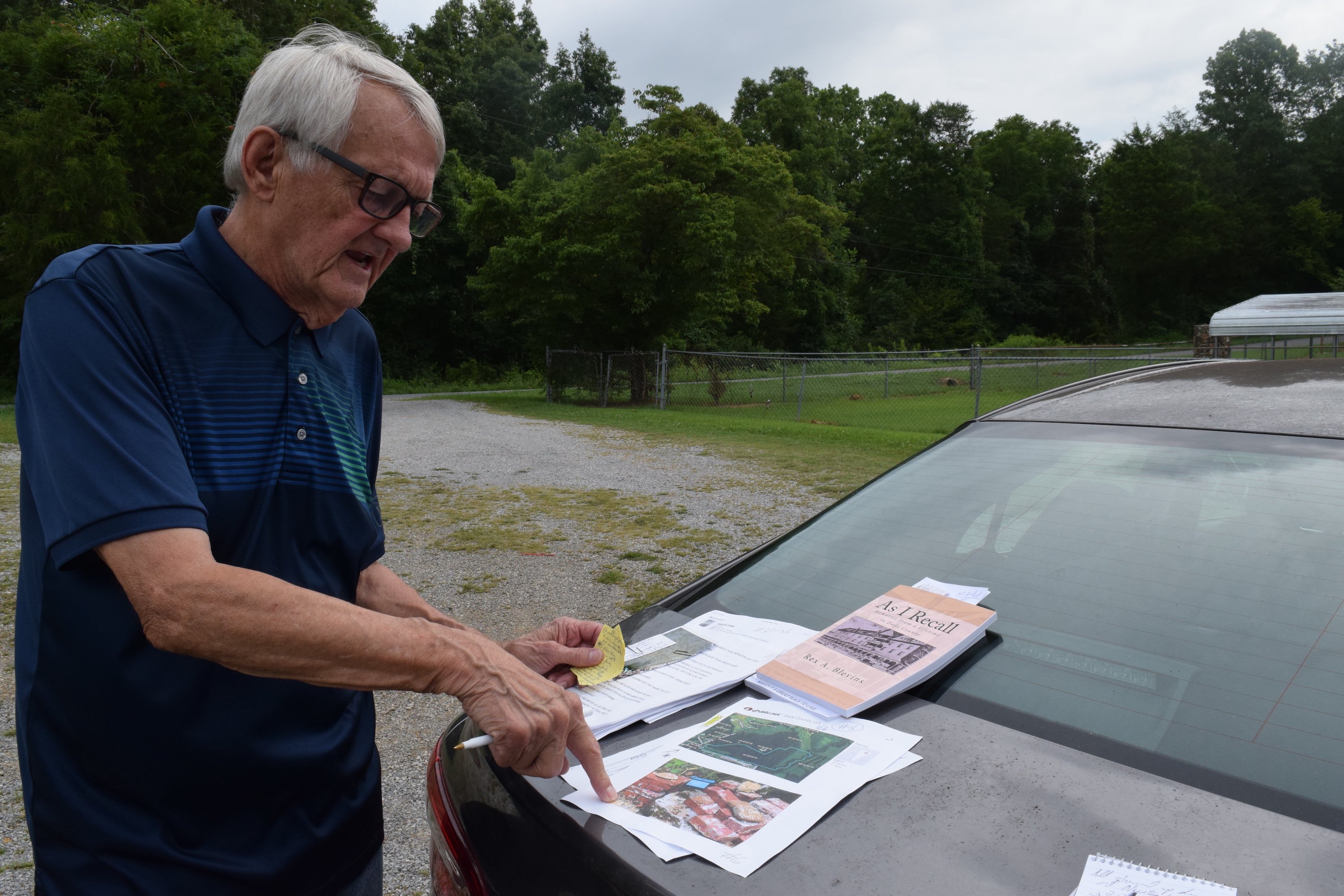WILDWOOD, Ga. - To most, she was known only as "Aunt Thenie."
Parthenia "Aunt Thenie" Strickland Brogden was born enslaved in Georgia and died a free woman in Georgia's Dade County almost a century later.
Brogden's is a story that should be preserved for her family, the community and her place in local history, Rex Blevins said Monday as he walked through Sarah's Chapel Cemetery under the bows of massive oak trees with limbs draped over graves dating back more than a century.
Brogden is linked to the Blevins family starting with a farm purchase more than 100 years ago, Blevins said.
In 1910, Blevins' great-grandmother, Paralee Blevins, bought a farm in Dade County where Brogden lived, said Blevins, who has written a couple of books on his and his family's history in Dade County. He calls his great-grandmother "mamaw."
"She lived on a plot of land on the farm," Blevins said, spreading out a small map of the property on the trunk lid of his car as cicadas began to sing with the rising summer heat Monday morning.
Brogden's home site lies on the edge of a field on the farm property in Dade County's New England community, and today it is marked with a small sign and some stacked bricks Blevins installed to establish its location.
"Aunt Thenie became a midwife to my mamaw," Blevins said, referring to her time as a freedwoman. "Every time my mamaw had a baby, Aunt Thenie was there to help deliver it. She was just a member of our family."
In the back corner of Sarah's Chapel Cemetery beneath the oaks, a small, new stone stands to mark Brogden's final resting place.
Blevins, who spelled the name "Thiney" on the marker and home place sign he installed, felt it was important to mark the site for future generations, and he's hoping this fall distant members of the family will come to Dade County to learn about their history during a cemetery tour planned in October by county historians at the site.
Blevins said he started looking for Brogden family members and found a descendant quickly and got some members to visit the gravesite and other important family sites. It was a tearful visit for the family and Blevins, he said. From there, it would lead to research into Brogden's life.
Research begins
The descendants don't want to be identified for now, Blevins said. He said another local historian has taken up a study of Brogden's story for a presentation during the tour.
Joy Odom, a researcher for the Dade County Historical Society, said Brogden is important to the county's sparse accounts of Black history because of her isolation and resilience before, during and after the Civil War. She said Blevins' curiosity and his family's link to Brogden got the research started by making contact with some of her descendants a few years back.
"As far as we can tell, Thenie Brogden and her husband were enslaved here, but we can't figure out who she belonged to because when you look at the slavery lists from 1850 and 1860, the names of slaves are not there, just ages," Odom said Tuesday in a phone interview.
Thenie Brogden's husband was Knox Brogden, but his age and place of birth remain unknown.
"When they were freed, her husband died very young, and she was left to make it with a whole bunch of kids," Odom said. "She was a wash-woman, and she helped women who were having babies, and she was noted for being able to treat people with herbs.
"She was an interesting character," Odom said.
Brogden and her family are an example of the struggle of Blacks in the South after the war, Odom said.
"She and her family were emblematic of what was going on in the South at that time because she and her family stayed in the county and farmed and did all the menial jobs," she said. "But the next generation began to move to Chattanooga - the railways had started to get big - and a lot of them went to work on the rail line. And in the third generation of their family, a number of them went north."
In the earliest days of her freedom, Brogden found herself a mother alone in a tiny all-white community north of Trenton but with valued skills her neighbors needed.
"Aunt Thenie was the only Black person in her community. She lived in the community of New England," Odom said. "She made herself useful to the people there and was highly thought of in that community."
Path to Dade
During the slavery era, it was likely Brogden and many other enslaved people who worked in Dade County were owned by out-of-county residents, so few local records exist, Odom said.
According to a historical account from Odom's research, it's likely Brogden's surname before her marriage, Strickland, was the surname of her former owner, but those records also are hard to trace because Odom found numerous slave owners named Strickland during the years Brogden lived in bondage. There were also many Brogdens.
Dade County was not home to many large plantations, but it did contain operations that were extensions of larger plantations elsewhere, according to Odom.
In 1840, there were at least 42 slaves in Dade County, including 13 boys and 10 girls under age 10, Odom said. None of the slaves were older than 35 or so, according to Odom's research. That count probably doesn't take in visiting laborers, she said.
"It is quite possible that whatever individual owned Thenie Strickland might have purchased land in this area and brought her here as labor," Odom said. "None of these potential landowners show up on the census, but that is not unusual as these folks tended to travel often between their properties."
Brogden's years surrounding the Civil War remain unclear, but she and her husband began their family in the early 1870s, after the war ended, Odom said.
"In the 1910 census, in response to a standard question that year, Thenie Brogden indicated she was the mother of seven children, only three of whom were living at that time," Odom said.
Brogden's was a hard path to the 20th century, but she built a foundation for the success of her family, according to Odom.
(READ MORE: Mystery graveyard emerges in Coffee County man's yard)
"It's a tragic story. She had a hard, hard life and most of her children had a hard life," Odom said. "But over generations her family crawled out of that hole and started to have lives she could have never imagined."
Odom and Blevins are hopeful Brogden descendants come in October for the tour of Sarah's Chapel Cemetery so the fourth generation of Brogden's family can take its place in history, she said.
Contact Ben Benton at bbenton@timesfreepress.com or 423-757-6569. Follow him on Twitter @BenBenton.

